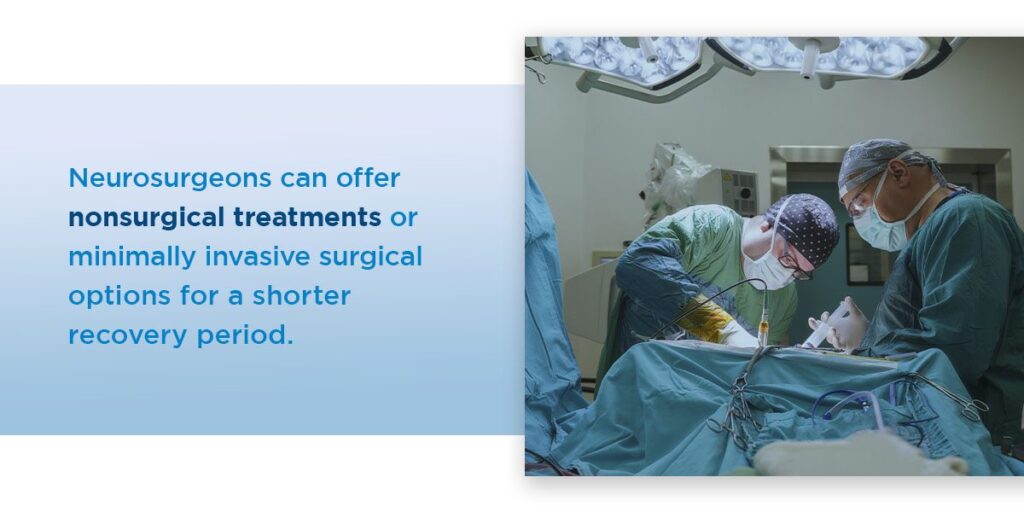

While neurosurgeons and neurologists have special education and training in the brain and the spine, their roles differ. What neurologists and neurosurgeons have in common is only that they work in the same area. Outside of that, they are very different. Continue reading for a guide on the difference between the two doctors and which you should see for treatment.
Both doctors can work together in some circumstances. For example, a neurologist may refer a patient with a pinched nerve to a neurosurgeon for a required surgery. A neurosurgeon will take over if a physical cause is discovered or thought to be behind the condition.
A neurologist is a doctor who diagnoses and treats conditions of the brain and nervous system — from headaches to Alzheimer’s disease. They are trained to understand the complex pathways and intricate workings of the nervous system, making them experts in neurological disorders.
Some neurologists specialize in degenerative disorders or chronic diseases. A few of the disorders they diagnose and treat are:
Their training also extends beyond the basics and into sleeping disorders and neuromuscular diseases. Another area they can offer support is nervous system infections. They frequently collaborate with other health care professionals, including neurosurgeons, when treatments require complex care.
To diagnose these conditions, they use a mix of physical exams and many other diagnostic tests, such as an electroencephalogram (EEG) or a computerized tomography (CT) scan. These tools allow them to see further and assess motor and sensory skills, balance and mental status.
Overall, they can perform and order certain diagnostic tests but cannot perform surgery. Their approach to treatment primarily involves managing symptoms. They also provide nonsurgical care, such as prescribing medications. If need be, they will recommend physical therapy or surgery and will monitor that transition.
Contrary to popular belief or media portrayals, a neurosurgeon does more than just brain surgery. A neurosurgeon is a medical doctor specializing in treating disorders affecting the brain, spine and peripheral nervous system. They can treat spinal conditions, including back pain, neck pain, sciatica, degenerative disc disease and herniated discs.
Neurosurgeons perform complex surgeries as needed but often opt for nonsurgical treatments first. Some surgeries can even be done in a minimally invasive format for quicker recovery times. Expertise includes:
Many people tend to see a neurologist when dealing with back pain because they fear a neurosurgeon will only offer surgery as the only treatment option. This isn’t always the case — neurosurgeons only perform surgery if immediately necessary or as a last resort.
If the pain is caused by nerve-related issues, such as sciatica or a pinched nerve, then neurologists can treat and manage the treatment. They can manage and prescribe medication and nerve blocks and advise on physical therapy.

But often, the case is of a structural problem, which is a neurosurgeon area. Neurosurgeons can offer nonsurgical treatments or minimally invasive surgical options for a shorter recovery period. They can determine whether surgery is necessary and give all options to the patient. Structural problems can include herniated discs, spinal stenosis or spinal deformities.
Consult a neurosurgeon if:
There are other cases where other professionals might be called in to assist or advise, like when back pain is related to the musculoskeletal system and may require an orthopedic surgeon. Chiropractors and physical therapists can be involved in the nonsurgical management of back pain and when there is a need to focus on rehabilitation and spine alignment.

At New York Spine Institute, our world-class neurosurgeon Dr. Nicholas Post, offers comprehensive spinal care for patients with spine or brain complications ranging from acute to debilitating.
NYSI is the sole independent spine and neurosurgical practice on Long Island, offering comprehensive spinal care that includes multiple subspecialties. Schedule your consultation with us and get on the road to recovery today.